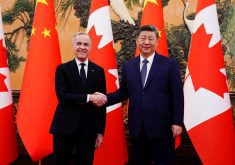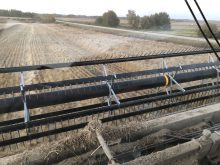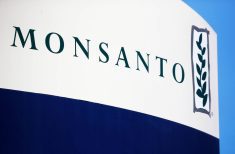It’s the job of the commentator to be a bit provocative and to make people think.
Geopolitical economist Peter Zeihan, who gave a keynote address at last week’s Ag Days, certainly accomplished that.
Pulling many threads together, from the war in Ukraine and Russia’s historic borders, past the sclerotic regime in Beijing incapable of adapting, to the hard-pressed European Union and its energy need, he painted a challenging global picture.
Read Also

Farm equipment market unlikely to pick up
North America’s farm machinery sales have been slow and uncertain thanks to tariffs and trade disruption. There’s not a lot of hope for change in 2026.
By the end of it all, attendees were certainly talking about what they’d heard in the hallways outside the meeting room.
His assertions in a nutshell are that the war in Ukraine is going to grind on for longer than any of us might think. While the Ukrainians have put up a stout defense, their early successes shouldn’t be taken as prelude to victory. The Russians will eventually throw a conscription army at the problem and turn it into a grinding war of attrition.
That will have a huge impact on global food supplies. This spring will be a crucial turning point, but it will take time to play out. While it does, there’s almost certainly going to be the spectre of global hunger and even outright famine, Zeihan said.
It may happen because Ukraine triggers one by cutting off irrigation water to key production areas and denying food to Russian troops and the surrounding population of mostly ethnic Russians.
“This is how Russia loses,” Zeihan said. “You prevent them from eating, by deliberately triggering a 1980s style Ethiopian famine.”
Or it may happen because the effects of the war finally hit the global food supply. In many ways, it’s miraculous that hasn’t already happened. However, decent harvests elsewhere and just enough Black Sea grain reaching world markets has staved it off — so far.
“This is probably the year it starts. We were very, very lucky last year,” he said. “It’s going to get horrendously ugly.”
In China, President Xi Jinping has centralized power too much, and even his closest advisors fear to tell him the truth for fear their lives will be forfeited, said Zeihan. That’s leading to bad decisions and an incapacity to make good decisions, because the glorious leader isn’t getting good information.
Zeihan went so far as to use the word ‘collapse’, noting that demographics and economic trends aren’t playing well for China. And he had one key point: “There’s no version that goes well for economic activity.”
From the perspective of a western Canadian farmer, it’s concerning when a major market is showing such pronounced signs of uncertainty. Zeihan suggested farmers here may want to reconsider their loyalty to canola in favour of wheat, which he said was going to become a very “exciting” crop from a marketing perspective.
In Europe he painted an extremely challenging path forward, generally related to energy availability. He noted that much of EU energy comes from far-flung gas fields. And much of its crop nutrients have come from Russia, the leading nitrogen exporter in the world.
Here in North America, the picture is a lot brighter. Canada is breaking its dependence on Russian nitrogen. U.S. nitrogen production capacity is expanding rapidly and Canada is just as quickly expanding potash production.
One limitation is phosphate, but what is imported to this continent mostly comes from reasonably stable and friendly nations such as Morocco. The energy picture, especially for natural gas, is far brighter. While shale fields and conventional gas from Alberta are reasonably accessible, the Europeans have far greater challenger, Zeihan said.
That’s evident in the price disparity. While North American gas prices have climbed, they’re only back to the normal range after more than a decade of record lows. Meantime, energy prices in Europe have reached record levels and show no signs of abating.
“We’ve been bitching about average energy costs but this is their new normal,” Zeihan said about Europe. “The closest natural gas fields that can feed Germany are in Nigeria. This is the price split between Anglo-America and the rest of the world for at least the next 12 years.”
So, while the global picture is grim, it’s a fair bit brighter in North America, Zeihan said.
“There will be some cost and labour issues, certainly there will be some problems, but nothing we need is endangered here — but they are everywhere else.”
What do you think about Zeihan’s ideas? We’d love to hear your thoughts on the fast-changing global environment and how farms can adapt. My email is [email protected].















